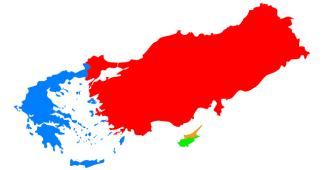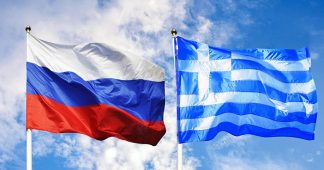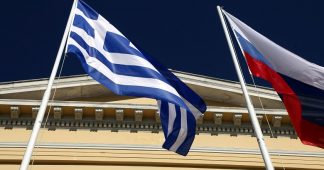By Dr. William Mallinson
Athens, 13 October 2019
The rather pompous US Secretary of State Pompeo’s recent visit to Athens, to underline the new love-in between Washington and Athens, was designed to pull the wool over the eyes of the Greek people, already battered into the ground by the economic crisis, a crisis engendered partly, and definitely exacerbated, by the ‘socialist’ Simitis government’s lying about statistics, aided and abetted by Goldman Sachs, with Simitis listening to Germany, and bringing Greece into the Euro in 2001. The path towards the love-in had of course been well-prepared by the new Greek Prime Minister Mitsotakis’s predecessor, the allegedly socialist Tsipras. In one fell swoop, he appears to have destroyed any notion of Greek independence, that had been so painstakingly built up by Andreas Papandreou in the Eighties.
Pompeo’s visit underlines the obvious: that Greece no longer has a foreign policy, but merely slipstreams and piggybacks what Washington decides. Before commenting on Pompeo’s PR offensive, a few basic facts need to be mentioned, even if in our society of digital imbeciles, memories are increasingly short, opinions are being replaced by appinions, and it is easier to manipulate the masses into indifference.
To even begin to understand why Greece, with the connivance of its mediocre and clientelistic Balkan politicians, is now an unwitting tool of a rogue state, and is being exposed to dangers of which its people are largely unaware, we must adopt a historical approach. Let us therefore be simple, and put down a few facts, before we comment. A book could be written about each fact, but we are constrained by a need to be concise, clear and cogent.
First, it was thanks to Russia’s intervention in the Nineteenth Century that Greece gained its internationally recognised sovereignty, albeit limited, in 1832. Britain had wished for Greece to have only autonomous status, under the Ottoman Empire. Britain’s game was to ensure that Greece did not move towards Russia. In 1941, the British Minister to Greece, said: ‘A truly independent Greece is an absurdity. Greece can either be English or Russian, and since it cannot be Russian, it is necessary that she be English.’ [1]
Second, during the Crimean War, Britain (and a self-interested France) blockaded Piraeus, to prevent Greece helping Russia.
Third, in 1878, Britain secretly rented Cyprus from the Ottoman Empire, to ‘guarantee Asiatic Turkey from Russian invasion’[2]
Fourth, Britain’s obsession with the Soviet Union (read Russia) contributed towards the Greek civil war. Extracts from a Foreign Office (FCO) paper prepared for the Foreign Minister, Anthony Eden, in June 1944 show how Britain betrayed their main anti-German Greek resistance allies, essentially because of her obsession with, and distrust of, the Soviet Union (which was for them Russia):
[…] Nor can any accusation be levelled against the Russians of organising the spread of communism in the Balkans.[…] The Soviet Government’s support of the Communist-led elements in these countries is not so much based on ideological grounds as on the fact that such elements are most responsive to and are the most vigorous in resisting the axis.[…] Furthermore, if anyone is to blame for the present situation in which the Communist-led movements are the most powerful elements in Yugoslavia and Greece, it is we ourselves. Russia’s historical interest in the Balkans has always manifested itself in a determination that no other Great Power shall dominate them, as this would constitute a strategical threat to Russia.[…] whereas in the nineteenth century we had Austro-Hungary as an ally to counter these Russian measures there is no one on whom we can count to support us this time. […] As a result of our approach to the Soviet Government, however, the latter have now agreed to let us take the lead in Greece.[3]
As Francis Noel-Baker wrote: Instead of making Greek resistance more moderate, more democratic, more truly representative of the mass of Greek opinion, we drove it to extremes.[4]
Fifth, Britain handed Greece to the US in 1947. The Truman Doctrine was all the rage in Greece and Turkey, while the first Mcarthyist tendencies were being exported from America.According to one expert, American agents in the Sixties were training Greek soldiers to kill pigs with a communist emblem painted on their (the pigs’) bodies, after being told to imagine that the pigs had raped their sisters.[5]
Sixth, the US was happy to condone Turkey’s invasion of Cyprus.
Seventh, despite Pompeo’s PR offensive, the US considers Turkey more important to its interests than Greece, reflecting British policy:
We should also recognise that in the final analysis Turkey must be regarded as more important to Western strategic interests than Greece and that, if risks must be run, they should be risks of further straining Greek rather than Turkish relations with the West.[6]
Comments
The above facts, well documented, but hardly understood, or, more likely, studiously ignored by the battered Greek people, demonstrate the current danger of the manic co-operation of the current Greek government with Washington’s objectives. Like the Pied Piper’s children, they believe that co-operating with Cyprus and Israel in Russia-unfriendly energy and military projects witl put a dampener on Turkey’s alleged neo-Ottoman ambitions. Yet, when and if it comes down to brass tacks, the US will always play Turkey’s game, the main reason being that the latter is playing a clever balancing game with Russia, for example by purchasing S-400s (not yet operational), and through its first nuclear power plant, to be built by Russia. Greece would not dare to play such a game, as Pompeo’s visit shows. Quite the opposite: they are playing the US’s anti-Russian game, against the natural inclination of its people. Here, we should remember that, lip service apart (for example US calls for Turkey to re-open the Halki seminary), the US will never seriously question Turkish claims on Greek territory. Despite the fact that Imia is marked as being Greek on American naval maps, the US did not threaten Turkey over its claims. Worse, when this author asked the US Embassy in Athens whether the US recognised Greece’s border with Turkey, the reply was:
Yes, but not all the territorial waters implications which Greece asserts. We have not taken a position on sovereignty over Imia/Kardak, in part because of the lack of an agreed maritime boundary.[7]
Similarly, the US does not recognise Greece’s ten-mile territorial airspace, but only a six-mile one.[8] As for the Israeli government, it refuses to answer the question.[9]
The Greek-Turkish arms market is one of the US’ most lucrative, but is under threat, given Turkey’s purchase of S-400s. The shareholders of the US’s military-industrial-congressional complex are clearly keen to redress the balance. Tension, but not war, between Greece and Turkey is a good way of keeping up arms sales, hence the US’s position on Greece’s borders. The US may even be hoping that by pretending to support Greece, Turkey may become a little jealous, and try to re-establish good relations with Washington. But at the end of the day, if it really comes to push and shove, the US will need to keep Turkey as its NATO ally.
Pompeo used his visit by publicly saying that ‘we must stop malign Russian influence’, ‘put pressure on Iran’, and ‘secure the Middle East’. To use his visit as a platform to spout such propaganda is an insult to Greece. Yet the supine Mitsotakis and his Foreign Minister Dendias are happy to support a rogue state, which, with its acolyte states, has destroyed Iraq,Syria,Libya and Afghanistan, and is trying to destroy Venezuela and Iran; which has almost replaced the UN as far as sanctions are concerned,threatening other countries with sanctions if they do not support US sanctions on third countries;which has transferred its embassyEmbassy to Jerusalem; which support the illegal Israeli occupation of the Golan Heights; and hastaken French leave of the Palestinian people, blatantly violatingUN Security Council Resolutions.
Just as with Britain in the Nineteenth Century and the last war, it is now the US which is preventing Greece from improving its relations with Russia.This all goes to show how right was Francesco Guicciardini when he wrote that the same things return with different colours.
It is little wonder that Russia distrusts Greece, and is improving its relations with Turkey. When and if Turkey decides to take some Greek islands, and perhaps a bit of Western Thrace, Russia may do little concrete, other than issue a statement calling for moderation, as may the US.
It is a shame that Greece’s clientelistic Balkan politicians are happy to help the US with its illegal plans. Greece is now part of the US, but an expendable part.
* Dr. William Mallinson, Professor of Political Ideas and Institutions, Universitá Guglielmo Marconi
[1] Sir Edmond Lyons, British Minister to Greece, 1841.
[2]Buckle, B.E., The Life of Benjamin Disraeli, Earl of Beaconsfield, London,1920, p.291.
[3] Top Secret Foreign Office Memorandum for Secretary of State, 7 June, 1944, BNA FO 371/43646, file R 9092. in Mallinson, William, Britain and Cyprus: Key Themes and Documents since World War Two [really World War Four], I.B.Tauris, London and New York, 2011, pp.12-14.
[4] Noel-Baker, Francis, Greece: The Whole Story, Hutchinson & Co., London, 1946, p. 43.
[5]Lieutenant-commander Martin Packard, author of Getting it Wrong (Author House, Milton Keynes, 2008), and in charge of a UN team in Cyprus in 1963/4, told me this on 6 November 2002.
[6]‘British Interests in the Eastern Mediterranean’, draft paper of 11 April 1975, FCO 46/1248, file DPI/516/1.
[7]Mallinson, William, Cyprus: A Modern History, I.B. Tauris, London and New York, 2005, 2008, 2012, pp. 150-151.
[8]Ibid., p. 151.
[9]Ibid.










